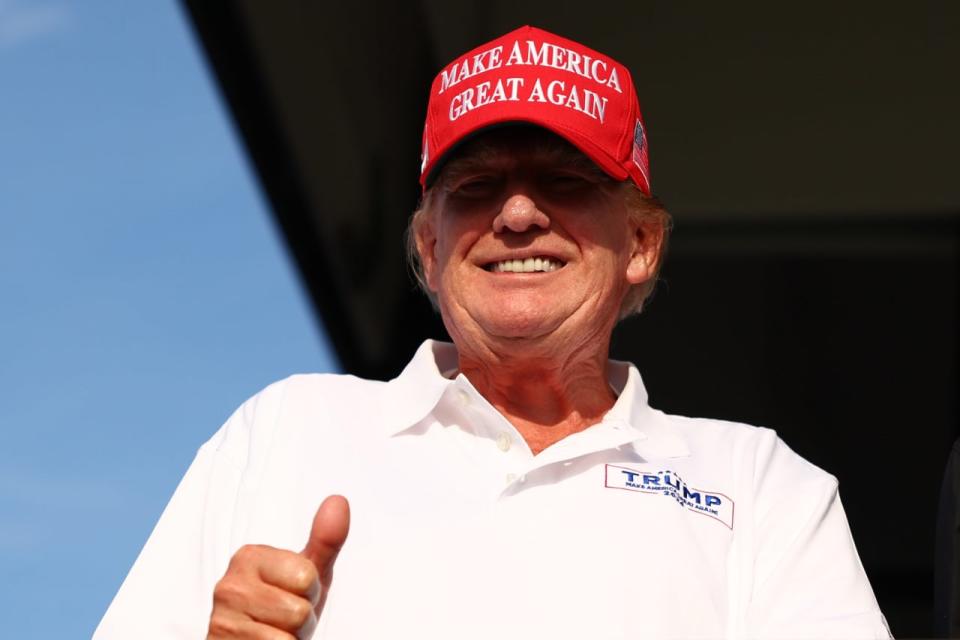Trump on track for $1 billion stock bonus â while outside investors lose up to 50%

Donald Trump is poised to make a huge profit from his latest venture, even as outside investors lose their shirts.
Most Read from MarketWatch
Stop me if you’ve heard this one before.
Shares in Trump Media & Technology Group, the parent company of the Twitter knockoff Truth Social, began trading under a ticker symbol matching the Republican former president’s initials DJT after being absorbed by the blank-check company Digital World Acquisition Corp. on March 26. After an initial wave of enthusiasm, “DJT” shares have been in a tailspin. They hit a postmerger low below $30 on Friday — down from the mid-$60s in the heady days after the deal closed — and were more recently changing hands at around $31, down 3% on the day and 23% on the week.
Outside investors are nursing losses potentially exceeding a billion dollars in aggregate.
“We know there’s currently about 30 [million] or 40 million tradeable shares,” says Matthew Kennedy, a senior strategist at Renaissance Capital, a provider of IPO-focused exchange-traded funds and pre-IPO institutional research. “To my knowledge, there’s no way to know how many Robinhood, Schwab, etc., accounts own the stock. [But] I suspect it’s a lot of retail ownership.”
Total trading volumes on that first day, in late March, came to 32 million shares. If that’s the scale of the mom-and-pop investors who piled into the stock, their losses to date will come to more than $1.1 billion.
What about Trump? Despite the mayhem, he’s on track for a big payday.
First, there are the 79 million shares he already owns. They effectively cost him nothing and are worth $2.4 billion even at their rapidly deflating price.
But, astonishingly, Trump’s likely windfall also includes a massive stock bonus that he is still on track to receive — even though the stock’s performance so far has been disastrous.
At current prices, this bonus would be worth more than $1 billion.
It’s all in the fine print of the prospectus. Trump stands to be given up to 36 million extra shares as long as the “dollar volume-weighted average price” of the stock exceeds certain very low thresholds during pretty much any 20-day period after the merger was completed.
Those threshold prices? Just $12.50, $15 and $17.50 a share.
Critically, Trump will get the bonus even if the stock keeps sinking and outside investors who bought into the stock at higher prices keep losing money. His deal is based on the average price across 20 days, rather than the price at the end of the period. Even better for him: It isn’t even based on a simple average but on an average price weighted toward the days with the biggest trading volumes.
Most of those days are in the rear-view mirror. About 30% of all the trading volume in “DJT” to date took place on the day the merger deal closed, when the price ranged between $62 and $72. As a result, the dollar volume-weighted average price over the stock’s first 12 days of trading remains well north of $50 — despite the recent collapse.
Thanks to this clever trick, Trump is now all but guaranteed to qualify for his bonus by the end of this month, no matter how much further the stock falls. Obviously, Trump would be better off if the stock remained elevated. The bonus is paid in shares, after all. But it gives him a big, fat cushion either way.
Some people may be surprised to hear that someone can get a massive stock-related bonus as a reward for their stock’s performance even as the stock collapses and outside investors get hosed.
If so, they probably haven’t done business with Trump before. Many of them now have.
Don’t say we didn’t warn you.
And warn you.
And warn you.
Even at the current stock price, Trump’s bonus would be worth $1.1 billion. As it happens, that is almost exactly the same amount of money that ordinary retail investors have lost on the stock since the company went public.
As lawyers like to say, res ipsa loquitur. That is, the thing speaks for itself.





